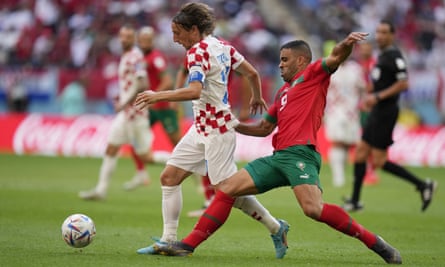Amid the stultifying debate over whether the ball had crossed the byline before Ao Tanaka’s winner for Japan against Spain, something more important was lost. The goal ultimately ensured that, for the first time, every inhabited continent was represented in a World Cup last 16. Less than a day would pass before South Korea enhanced Asia’s contingent, guaranteeing the most diverse knockout stage in the tournament’s history.
It makes for a mouthwatering set of ties and will also be music to the ears of Qatar, which assiduously posits itself as a unifying force regardless of evidence to the contrary. Hosting a competition with a greater global spread of participants than any other is not hard to spin positively: the mix is a consequence of drama that, after a slow start, gave this group stage a claim to be the best ever on pure footballing terms.
Those outside Europe and South America have particular cause to agree. Six countries from beyond football’s traditional powerhouse continents have reached the knockout stage and, in the nine previous iterations to include a last 16, that had never been done. Africa has matched its best performance in qualifying two of its five entrants, Morocco and Senegal, without the presence of stars such as Sadio Mané, Riyad Mahrez, Victor Osimhen and Mohamed Salah; Asia has equalled its high-water mark of 2002. The Asian Football Confederation can claim its best performance given Australia have fallen under its aegis since 2006.

What does any of this mean? It may be folly to draw sweeping conclusions given, for those not in Europe, small allocations mean the line between perceived success and failure can be wafer thin. One result can change everything. Only four years have passed since Africa was soul-searching after failing to send anyone beyond the group stage, Didier Drogba describing it as “a big step back”.
Now it can point to a World Cup that, on one level, has already been its best: African teams have won a record seven matches in Qatar and only a decent Ghana side, whose fortunes turned on André Ayew’s early penalty miss against Uruguay, recorded fewer than four points. The standard of football in Africa has not rollercoastered that wildly over the past half-decade in practice.
“It’s very, very difficult to get far if you have five slots,” the then Ghana manager, Otto Addo, pointed out after their opening defeat by Portugal. “If you have 12 or 14 slots the probability that a team will get further is much, much higher.”
Africa will have at least nine sides at the expanded World Cup in 2026, one of whose vanishingly few blessings is that increased allocations for the previously less favoured regions should make it easier to detect trends. Asia’s contingent will rise by at least two. A third of the slots will come from Europe, down from its current share of 40%.
Given hopeful proclamations of a new world order did not come to pass after 2002, when Senegal joined the cohosts South Korea in the quarter-finals, optimism about a wider levelling up should be tempered. But the idea is not entirely fanciful. It was striking to hear the Morocco coach, Walid Megraoui, speaking after the tight goalless draw with Croatia that set the foundations for his team’s later success.

“We played like a European team and that’s why I am so happy,” he said. “If we had played brilliantly and lost then everyone would be very upset. We played in a very solid way like a European team and made it difficult for them to play against us. We need to look at African specifics and understand how to win when a match is tight.”
It suggests that, in a football world of few secrets, the intensely drilled methods honed in the Premier League, Bundesliga, La Liga and Serie A may finally have seeped down into the more chaotic realm of the international game. Bar Qatar and Saudi Arabia, whose respective fortunes were decidedly mixed, every squad in this tournament has a generous sprinkling of players from those major domestic leagues.
That is hardly new: it has been the case for two decades. But when they are augmented by a generation of tactically smart, quick-thinking coaches who understand how to harness the qualities taught abroad in a short preparation time, perhaps it heralds the next step. “The gold standard in the world,” is how the Japan coach, Hajime Moriyasu, referred to European football before defeating Spain. The Japanese game has had strong links with Germany, in particular, for many years.

On one level, such assessments breed discomfort: the instinctive thought is that Asian and African sides should not feel compelled to eschew their own styles in deference to theories honed in Manchester, Munich and Madrid. Homogenisation should not be the only way. But that is where football has long been headed and it becomes more palatable if the “European” benchmark is seen as a global one, practised by players and coaches from across the world, that happens to have taken hold there.
South American teams have long trodden a successful balance between what works locally and abroad. But this has been an unprepossessing World Cup for Conmebol so far, only two of their teams progressing. That has happened only twice before. Brazil and Argentina both began the tournament with convincing claims to go all the way but, even if Ecuador and Uruguay would both have qualified with four points in a different year, there are no support acts in the knockout stage.
Again, those fine margins: seven of the eight groups contained a team that missed out despite recording a win and a draw. It means nobody has too much cause to fret; if hitherto unheralded outposts are expressing themselves more volubly now, it simply means this tournament is doing the job it should. And even if Europe has only twice been represented more thinly than this in a last 16, a 50% share of the places still tells a tale.
For all the analysis and grasping for reasons, on Saturday night an Australian striker called Mitchell Duke from the Japanese second-tier side Fagiano Okayama will have had reasonable cause to believe he can outgun Lionel Messi and Argentina. Maybe that, more than anything else, speaks of the breadth that lies in front of us.
Source : TheGuardian









